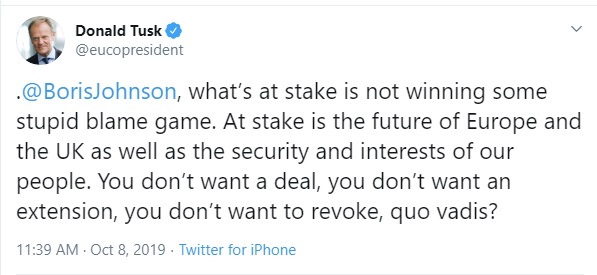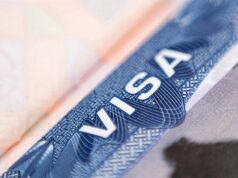A No 10 source says a Brexit deal is “essentially impossible” after a call between the PM and Angela Merkel.
Boris Johnson spoke to the German chancellor earlier about the proposals he put forward to the EU – but the source said she made clear a deal based on them was “overwhelmingly unlikely”.
They also claimed she said a deal would never be possible unless Northern Ireland stayed in a customs union.
Mrs Merkel’s spokesman said they did not reveal confidential conversations.
The President of the European Council, Donald Tusk, sent a public tweet to Mr Johnson, writing: “What’s at stake is not winning some stupid blame game. At stake is the future of Europe and the UK as well as the security and interests of our people.”

Scotland’s First Minister and leader of the SNP, Nicola Sturgeon, said Downing Street’s response to the phone call was an “attempt to shift the blame for the Brexit fiasco”, while Labour called it a “cynical attempt to sabotage the negotiations”.
Shadow Brexit secretary Sir Keir Starmer said Mr Johnson “will never take responsibility for his own failure to put forward a credible deal”, and called on Parliament to “unite prevent this reckless government crashing us out of the EU”.
The PM has insisted the UK will leave the EU on the Brexit deadline of 31 October, with or without a deal.
That is despite legislation passed by MPs last month, known as the Benn Act, which requires Mr Johnson to write to the EU requesting a further delay if no deal is signed off by Parliament by 19 October – unless MPs agree to a no-deal Brexit.
Mr Johnson sent new proposals for a deal to Brussels last week, with the key focus being on replacing the so-called backstop – the policy negotiated by Theresa May and the EU to prevent a hard border returning to the island of Ireland – which has long been a sticking point.
After presenting the new proposals, government sources hoped the UK might be able to enter an intense 10-day period of negotiations almost immediately, with the aim of coming to a final agreement at an EU summit on 17 October.
The EU pledged to examine them carefully, but a number of senior figures, including Irish Taoiseach Leo Varadkar, warned they did not form the basis for deeper negotiations – even if they believed a deal could still be done.
French President Emanuel Macron said the EU would decide at the end of the week whether a new deal was possible.
But after the phone call on Tuesday morning, the No 10 source said it had been a “clarifying moment”, adding: “Talks in Brussels are close to breaking down, despite the fact that the UK has moved a long way.”























